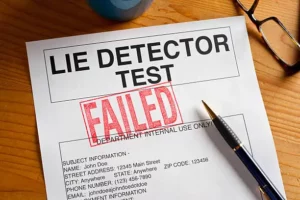So you took a polygraph test and failed. Don’t panic! With the right preparation and knowledge, you can successfully appeal the results and try again. Polygraphs can be inaccurate in some cases, so there are many valid reasons why you may have failed even if you’re telling the truth. Follow this guide to learn how to craft an airtight appeal and convince the examiner to re-test you.
Understand Why You Failed

First things first – analyze the potential reasons your results came back inconclusive or deceptive.
- Nerves – Simply being anxious about the high-pressure test can alter your physiological responses and skew the results. If you went in feeling excessively nervous, this could have caused “false positives” when you were indeed telling the truth.
- Medical conditions – Certain health issues like arrhythmia, breathing disorders, or medications can also affect the exam’s accuracy. If any apply to you, point them out in your appeal.
- Poor preparation – Failing to get adequate rest, avoid stimulants, or thinking about other personal stressors beforehand could have impacted the outcome. Note ways you can improve your prep next time.
- Invalid questions – Some questions may have been too vague, intense, or irrelevant to the purpose of the polygraph. Ambiguous queries can muddle results.
- Incorrect polygraph procedure – If the examiner made mistakes in attaching sensors, establishing a “baseline”, calibrating equipment, or administering length/number of tests, the results could be faulty.
- Examiner’s attitude – A hostile, skeptical or judgmental demeanor from the examiner could have negatively influenced your mental state and replies throughout.
Once you identify potential reasons for failure, you can construct a stronger, more logical appeal.
Compile Supporting Documentation
To back up the reasons you cite for the inaccurate results, gather any documentation you can. The more evidence you provide, the better. Include things like:
- Doctor’s notes about medical conditions that could impact results
- Prescriptions or names of medications taken close to the exam date
- Proof of extreme emotional stress you were under when tested
- Copies of vague, misleading or irrelevant questions asked
- Statements from references vouching for your honesty/credibility
- Notes taken during test about odd examiner behaviors or actions
- Published polygraph techniques that weren’t followed properly
- Any additional emails, notes, or info related to your case
Compile everything into an organized, annotated appeal file. Bring physical copies to submit, plus a digital version. Thorough documentation strengthens credibility.
Outline Your Formal Written Appeal

Draft a professional letter or memo that clearly lays out the grounds for your appeal. Cover these key points:
Introduction – State you are formally appealing the decision based on evidence of inaccuracy. Specify job/purpose of the failed test.
Polygraph Procedures – Note if preparation instructions weren’t provided or followed consistently by both parties. Describe any issues that arose with testing facilities, equipment, measurements, length of exam, or actions by the examiner.
Question Critique – Detail any questions you found vague, irrelevant, or confusing. Explain how each may have unfairly skewed results. If allowed, attach copies of the full questions asked. Learn more about how a polygraph works.
Physiological Factors – Describe medical conditions, physical limitations, or mental state at the time that could have affected readings. Attach doctor notes as documentation.
Actions Requested – Politely request a re-test with specific actions implemented. Ask for a different examiner if applicable. Set firm parameters for question types and proper procedures.
Conclusion – Thank them for reconsidering your case based on evidence provided. Reiterate your commitment to honesty and passing a fair, scientifically-valid retest.
Follow up with your supervisor by email, attaching the formal appeal letter and supporting documents. Be confident yet cordial. The more professional your approach, the better.
Verbally Present Your Case

If granted an appeal hearing, take advantage of the opportunity to restate your case face-to-face. Prepare main talking points ahead of time for a smooth delivery.
Introduction – Thank them for their time and state you will prove the initial polygraph’s inaccuracy.
Key Details – Cover the main factors that likely contributed to a false result. Keep explanations clear and free of excessive detail or tangents.
Supporting Evidence – Reference precise pages in your accompanying documentation that back up the key points. Avoid simply repeating the same info from your letter.
Questions Welcomed – Invite questions from the review board and answer honestly. This shows you have nothing to hide.
Recommended Actions – Be prepared to restate constructive steps that will ensure valid results in a re-test. Project confidence this is achievable.
Conclusion – Express your appreciation for their consideration and reaffirm eagerness to take a fair, scientifically-sound re-examination.
Your in-person tone should aim for polite yet firm. Avoid excuses or excessive emotion. Stick to the facts at hand. Making eye contact and expressing gratitude for their time also helps create a positive impression.
Prepare appropriately for your next test

If granted your request for re-examination, take steps to expertly prepare and avoid the same pitfalls. Here are key strategies:
- Learn the proper procedures – Study up on how polygraph exams should be administered and scored for legal, ethical purposes. Know the rules.
- Get a good night’s rest – Don’t stay up anxious the night before. Aim for at least 8 hours of sleep to be alert and focused.
- Limit stimulants beforehand – Avoid caffeine, nicotine, or other stimulants at least 4-6 hours prior. Don’t take any unapproved medications that could interfere.
- Focus your mindset – During the actual test, listen carefully to each question and answer as honestly as possible. Stay cool, composed, and cooperative.
- Ask for clarification – If any question seems unclear or irrelevant, politely ask for it to be rephrased before answering. Don’t leave room for misinterpretation.
Use Legal Options If Necessary

Hopefully by presenting a clear, evidence-based appeal and retaking the test in a fair manner, you can put the issue to rest. However, if you still fail the re-examination and sincerely believe it was administered improperly or scored inaccurately, consider legal avenues.
- Consult with an experienced attorney to review your case and determine if you have solid grounds for a lawsuit. False polygraph results can form the basis for a defamation or negligence claim depending on specific circumstances.
- File formal complaints with organizations like the American Polygraph Association citing unethical or unscientific practices by the examiner. Include your supporting evidence. This creates a paper trail.
- Report the examiner to your state licensing board if they violated regulations. Each state has laws governing proper polygraph testing procedures and examiner conduct.
- Contact your elected officials or media outlets if your situation appears to reflect systemic corruption or abuse of polygraphs. Shine a wider spotlight on the issue.
With persistence and continued reliance on facts rather than emotion, even legal action can effectively combat unfair or inaccurate polygraph testing practices. But in most cases, a well-constructed appeal is sufficient to get a second chance to take a new, legally-compliant test.
Don’t jeopardize Your Appeal’s Success

When going through the appeals process, some actions could inadvertently compromise your chances of overturning the initial failed result:
- Displaying excessive anger or hostility rather than professional urgency. Refrain from personal attacks.
- Making accusatory statements without hard evidence to back them up. Stick to facts.
- Withholding or lying about details of your experience with the polygraph procedure or examiner. Total honesty is key.
- Failing to point out what you will specifically do differently when retested. Don’t appear ambivalent about improvements.
- Missing filing deadlines or protocol for submitting appeals materials. Carefully follow all guidelines.
- Trying unproven “tricks” to fool the test instead of simply answering truthfully. No weird bodily tensing or pain infliction!
- Overestimating the sympathy an appeal board will have. Don’t rely on emotion – lay out solid logic.
- Submitting sloppy, disorganized or error-filled written materials. Proofread closely.
Appealing a polygraph failure is very achievable. Just keep your case grounded in facts, stay solution-focused, and follow protocol to the letter. With an intelligent strategy and persistence, you can definitively prove the results wrong.

